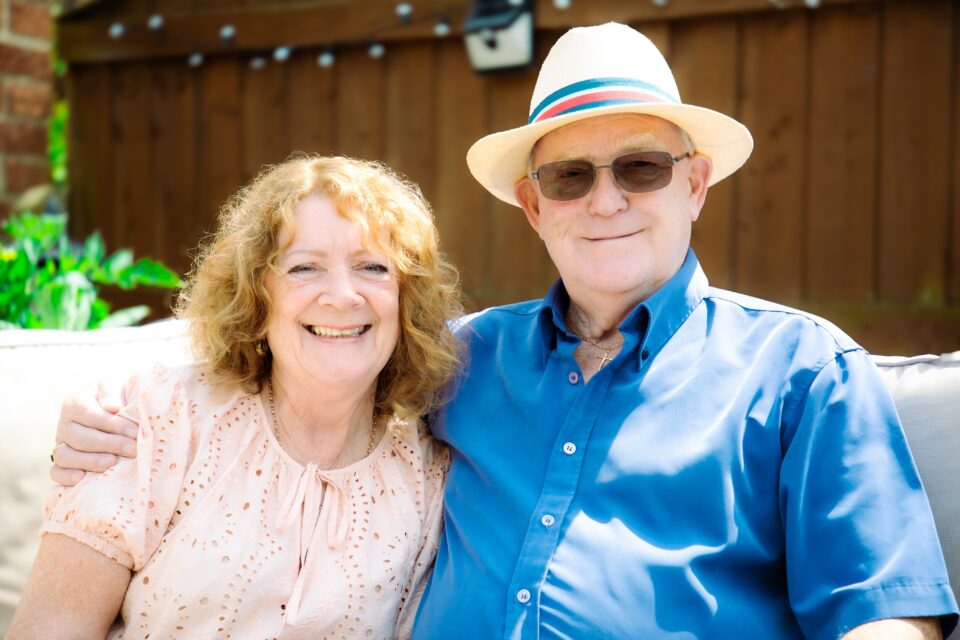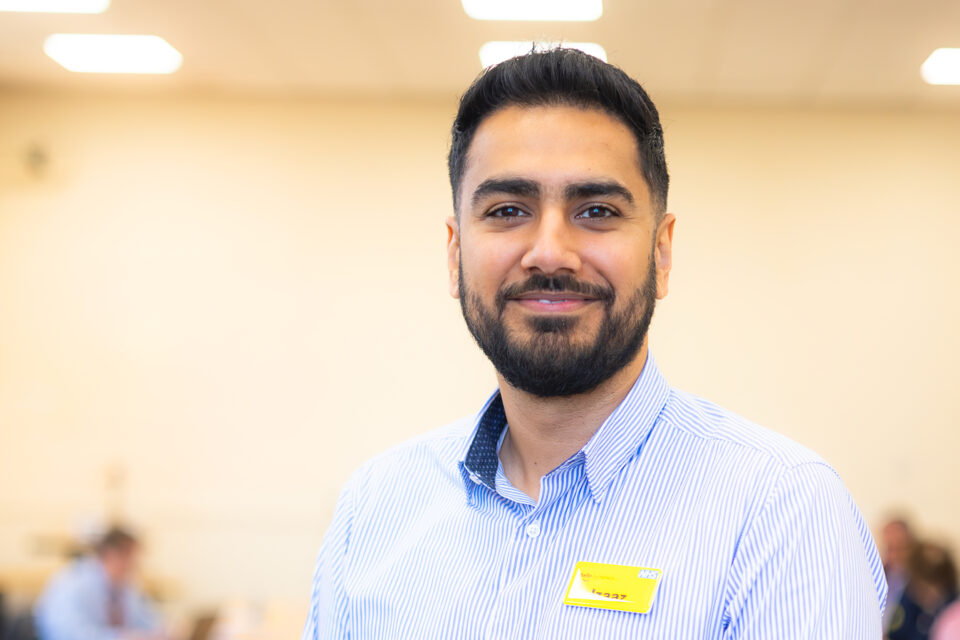Contents
- Delivering our 28 promises
- Rotherham turns out for fun day and annual members meeting
- Capital schemes are coming on stream
- Virtual ward supports more than 1000 people
- New patient and carer feedback system roll-out
- Investment in reducing waiting times
- Improving access to attention deficit hyperactivity disorder services
- Pioneering apprenticeship programme signals major change
- Poverty proofing our services
- Partner governor elections
- Voices of RDaSH shines a spotlight on importance of Talking Therapies
- Nomination open for annual staff awards 2024
Delivering our 28 promises
It’s that time of year when we reflect and look back on the progress and challenges from the past year.
Our recently published annual report 2023 to 2024 highlights the trust’s work, with partners, to deliver the 28 promises which form our clinical and organisational strategy 2023 to 2028 to nurture the power in our communities.
The promises matter to us, and we hope to you. They reflect changes that we want to make in what we do, who we work with, and how we care. They also represent a new relationship with our communities. After the intensity of the pandemic, recognising the poverty and isolation of a cost of living crisis, we want to place our services, our research, and our education and employment roles at the heart of the many and different communities that we serve.
You can read all 28 promises, which were developed in October 2023 alongside local communities, our partners and our people, and our honest assessment of progress to date.
Rotherham turns out for fun day and annual members meeting
Around 3000 people came to Clifton Park in Rotherham to take part in the first annual RDaSH fun day. The event took place in the beautiful park in the heart of Rotherham, combining a community event with our annual members meeting.
RDaSH teams connected with residents, sharing information about the services they offer. The day attracted lots of families making the most of the free fun activities like face painting, roving dinosaurs and the multitude of games and play areas.
We were joined by a range of community organisations like Healthwatch (opens in new window) and Andy’s Man Club (opens in new window) who had a steady flow of people coming to their stands.
It was a great success and the aim is to connect with more communities next year by hosting a similar event in the North Lincolnshire area.

Capital schemes are coming on stream
A multi million pound capital investment programme is well underway across the trust, promising major benefits to both patients and staff colleagues alike.
NHS South Yorkshire Integrated Care Board has provided £6.6 million of capital funding for major projects during the current financial year, some of which are nearing completion, with others due to start soon.
At Rotherham’s Swallownest Court, the Sandpiper and Osprey adult mental health wards have had extensive makeovers, providing extensive specialist upgrades and reconfiguration work, including improvements to bedrooms and ensuite rooms.
Sandpiper is completed and Osprey’s move home from the Goldcrest decant ward is set to take place shortly.
In Doncaster, five bungalows at Bentley’s Emerald Lodge have been transformed. One will become a new primary care mental health hub, two will become the new home of the 0 to 5 children’s services team following their relocation from Bentley Health Centre, and two further bungalows will be taken up by children’s services colleagues who were previously based in rented accommodation at Sprotbrough, now bringing them into our in-house facilities as part of an efficiency programme.
In North Lincolnshire, a design team of architects, quantity surveyors and mechanical and electrical engineers has been appointed to plan extensive refurbishments at Great Oaks’ Mulberry and Laurel adult mental health and older people’s wards. The next phase of work is expected to start in October and be completed in March 2025, with further modernisation planned to take place subject to securing further funding in 2025 to 2026, which will include alterations to the main entrance area.
Read more about our capital programme for the coming year.
Virtual ward supports more than 1000 people
Over 1000 people have now used the Home First virtual ward service.
Virtual wards, which are an extension of hospital services and happen in patients’ homes, are run in partnership by RDaSH and Doncaster and Bassetlaw Teaching Hospitals under the Home First service.
Following the success and learning from the roll-out in Doncaster, we are currently working with care home colleagues across Rotherham and North Lincolnshire to optimise the support we are able to offer there too.
Frank Jackson from Askern went under the care of a “virtual ward” in his own home, he says it most likely saved his life.
“After tests at Doncaster Royal Infirmary, I was allowed home the following day and placed on a virtual ward. The big advantage for me was that I wasn’t admitted to hospital. I could come home and be in my own environment and the nurses came to me. I could not have wished for better nurses to visit me.”
Virtual wards, and their effectiveness in helping people live well, is increasingly apparent. You can watch Frank talk about his experience and hear what a difference it has made to his recovery.

New patient and carer feedback system roll-out
We have recently launched Care Opinion and by October 2024 this will replace our existing paper-based feedback system for all services across RDaSH. This will vastly improve people’s opportunity to feedback as well as the timeliness of receiving a response.
It plays a crucial role in our ability to respond to individuals directly and to spot issues and emerging themes. Increasingly, learning from this feedback will be at the heart of trust level decision-making, both through our learning half days and through delivery reviews.
On a practical level, Care Opinion collects all feedback. Once you have fed back then Care Opinion will share your story online, so everyone can read it. Your personal details are never shared, so you stay safe. When your story is published, or you receive a response, Care Opinion will let you know by email.

Investment in reducing waiting times
A plan to achieve the waiting time standards for many trust services is in place, including adult ADHD and complex psychology support. The trust now meets national waiting times standards, which it had not done before 2023, and revised reporting of referral to treatment waiting times has been implemented.
Our most recent data show that we are close to meeting our national commitment to a four-week wait within children and adolescent mental health services (CAMHS).
Further work to meet this waiting time for children in neurodiversity services is underway, supported by an investment of £1.6million.
Implementation across RDaSH of the Thrive model is also intended to help support this work, alongside deeper collaboration with the third sector.
Improving access to attention deficit hyperactivity disorder services
From August our ADHD team will offer a single phone number which will, in effect, become the new front door contact point for people with ADHD. This single point of access provides a 24-hour response to calls, improving access for our patients out of hours and preventing the use of answer phones.
Alongside this simplified offer for people using these services, the ADHD team has started a single triage process which will improve consistency and responsiveness across all three of the areas we cover.
Pioneering apprenticeship programme signals major change
From September, the trust is making a major change to tilt training spend firmly towards lower salaried colleagues who historically have had less access to funding.
Our apprentice first programme will ensure that people coming into our organisation on an NHS pay band 2 and 3 will routinely join apprenticeship schemes intended to support their learning and skills.
Recently appointed director of finance and estates, Izaaz Mohammed, is a chartered accountant by profession having achieved this through starting his career as an apprentice.

Izaaz explains: “I spent a few weeks at university after my A levels, and for various reasons, some of which were my caring responsibilities, I realised it wasn’t for me. After a few years of working various jobs, I landed a job in an NHS finance department, and that’s when things started to turn around for me.
“So, you can probably understand why I’m really excited about our ambition to move to apprentice first for some of our roles. Traditional routes of study and entry into the workforce don’t work for everyone and just think of the number of potential people we’re missing out on if we don’t have apprenticeships front and centre of our recruitment plans.”
Poverty proofing our services
Three RDaSH services are now well underway with work to poverty proof them as part of promise to poverty proof all our services by 2025 to tackle discrimination, including through digital exclusion.
Poverty proofing aims to remove the financial barriers from a person’s access to the healthcare that they need. Typical barriers can range from unaffordable transport, unaffordable prescriptions or treatment plans through to minimal awareness from staff about how these things have a real impact on people’s access to care and their wellbeing.
We are collaborating with organisations who have expertise in poverty proofing and welfare rights.
We’re seeing progress in the first three services, based across a range of locations:
- children and adolescents’ mental health services (CAMHS) in North Lincolnshire
- podiatry in Doncaster
- early intervention in psychosis in Rotherham
Partner governor elections
Within our Council of Governors we have allocated a number of seats to key partners. These individuals sit alongside our other governors who include members of the public, our services users and carers and our staff and together form the Council of Governors. Collectively they fulfil a number of statutory roles and responsibilities, but they also provide an incredible resource from which the trust can learn and engage with. They offer a unique insight into the trust, its services and the communities we serve. The Council of Governors meets four times a year, with governors provided with many other opportunities to be involved within the trust and externally with other fellow governors.
Over the coming months we are determined to ensure every governor seat is filled. Our partner governor seats are presented below. We would ask those partners referenced and with a vacancy to consider the opportunity; to talk to us about it and to identify a representative to be part of our Council of Governors.
Full details on the role, time commitment and indeed any aspect of appointing to these seats can be provided by Philip Gowland, Director of Corporate Assurance at:
- Email: p.gowland@nhs.net
| Organisation | Number of seats | Partner governor |
|---|---|---|
| City of Doncaster council | One seat | Lee Golze |
| Rotherham Metropolitan Borough council | One seat | Councillor Linda Beresford |
| North Lincolnshire council | One seat | Roxanne Kirby |
| GP | One seat representing the Local medical committees (LMCs) within Doncaster, Rotherham and North Lincolnshire | Dr Dean Eggitt |
| University | One seat representing the University of Sheffield, Sheffield Hallam University and Hull and York Medical School | Vacant |
| Integrated care board (ICB) | One seat representing NHS South Yorkshire ICB and NHS Humber and North Yorkshire ICB | Vacant |
| Voluntary sector | One seat representing Voluntary Action Doncaster, Voluntary Action Rotherham and Voluntary Action North Lincolnshire | Vacant |
| Healthwatch | One seat representing Healthwatch Doncaster, Healthwatch Rotherham and Healthwatch North Lincolnshire | Vacant |
| Youth Forum | Two seats representing the Youth Forum established from within the RDaSH Children’s Care Group | Vacant |
Voices of RDaSH shines a spotlight on importance of Talking Therapies
Every Friday you can watch our weekly video round-up (opens in new window) of what’s happening across the trust. Leaders from across the organisation contribute to these, providing a unique opportunity to get to know the people behind the roles, as well as hear more about the areas they work in.
Our latest voice of RDaSH is Selina Khunkhuna (opens in new window), our new clinical service lead for the Talking Therapies services. Selina shares her lived experience of mental health and tells us about the work we’re doing to make Talking Therapies services more accessible and appealing to older people across our communities.
Nominations open for the annual staff awards 2024
Our annual staff and volunteer awards (opens in new window) take place on 22 November and nominations are open now until 31 August.
This year we’re inviting partners and the public to nominate in two special categories and we’d welcome your support in this.
Firstly, we’re looking for the RDaSH volunteer of the year. There are around 120 volunteers across the trust who generously give their skills, experiences and time to help others.
Secondly, there is a category to recognise a person or team, from across RDaSH, who shows that they are ‘nurturing the power of our communities’.
You can help by either nominating someone or encouraging others to do so. Here’s how to nominate.

Thank you for reading.
If you have any questions, please contact Jo McDonough, Director of Strategic Development at:
- Email: joanne.mcdonough@nhs.net
Page last reviewed: March 25, 2025
Next review due: March 25, 2026
Problem with this page?
Please tell us about any problems you have found with this web page.
Report a problem